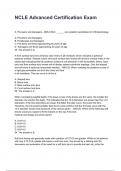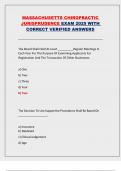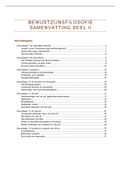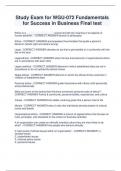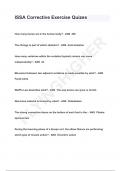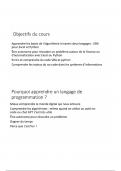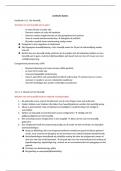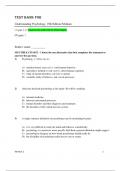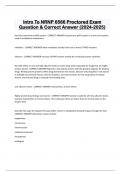A. Pre-teens and teenagers - ANS-Ch8-2. ______ are excellent candidates for Orthokeratology.
A. Pre-teens and teenagers
B. Presbyopes and teenagers
C. Pre-teens and those approaching 50 years of age
D. Teenagers and those approaching 30 years of age
25. The answer is D.
A front surface toric lens will show clear mires in all meridians which indicates a spherical
posterior surface. Warped, bitoric and back surface toric lenses will all show unclear mires in the
radiuscope indicating that the posterior surface is not spherical. In the lensometer, bitoric, back
toric and front surface toric lenses will all display sphero-cylindrical readings. Only the warped
lens will show a spherical lensometer reading. - ANS-25. When verifying the posterior curves of
a rigid gas permeable not all of the mires are clear
in all meridians. This can occur in all but a:
A. Warped lens
B. Bitoric lens
C. Back surface toric lens
D. Front surface toric lens
50. The answer is C.
When considering sagittal depth, if the base curves of the lenses are the same, the smaller the
diameter, the shorter the depth. This indicates that the 14.0 diameters are looser than the 14.5
diameters. If the lens diameters are equal, the flatter the base curve, the looser the lens.
Therefore, the 8.8 would be flatter than the 8.4 and confirms that the 8.8 base curve with the
14.0 diameter would most loosely fit of the choices given. - ANS-50. Which of the following soft
lenses would you expect to fit the loosest on the eye if the lens
material and design are all the same?
A. 8.4/14.0
B. 8.4/14.5
C. 8.8/14.0
D. 8.8/14.5
54. The answer is B.
Soft toric lenses are generally made with cylinders of 0.75 D and greater. While not all patients
with only 0.75 D of cylinder will require a soft toric lens, this should be a starting point for
discussion and evaluation of the need for a soft toric lens to provide the best visi_onfor the
,patient. - ANS-54. What is the least amount of cylinder a patient should have before soft toric
lenses are discussed?
A. 0.25 D
B. 0.75 D
C. 1.25 D
D. 2.00 D
A. 10 - ANS-Ch2-8. A tear break-up time (TBUT) of less than _____ seconds is considered
abnormal.
A. 10
B. 12
C. 14
D. 16
A. 10% - ANS-Ch11-10. Approximately how many ophthalmologists in the United States perform
RK?
A. 10%
B. 25%
C. 50%
D. 90%
A. 11.8mm, 12.0mm - ANS-Ch3-3. In a study done at Pacific University, researchers
topographically measured the HVIDs of 200 corneas and found the average corneal diameter to
be __ and __ to be the most frequent diameter.
A. 11.8mm, 12.0mm
B. 12.3mm, 12.5mm
C. 12.8mm, 13.0mm
D. 13.2mm, 13.5mm
A. 20/80. - ANS-Ch7-6. At birth, the average child has a visual acuity approximating
A. 20/80.
B. 20/40.
C. 20/200.
D. 20/25.
A. 200 years. - ANS-Ch1-17. Keratoconus, as a condition, has been recognized for
approximately
A. 200 years.
B. 150 years.
C. 100 years.
D. 50 years.
A. a large difference in refractive errors between the two eyes. - ANS-Ch8-4. Anisometropia is
,A. a large difference in refractive errors between the two eyes.
B. an imbalance in eye muscles.
C. a contraindication to contact lens wear.
D. best managed by custom soft contact lenses.
A. air bubbles under the lens. - ANS-Ch4-9. Prior to insertion, it is important that the hybrid
contact lens be filled with saline to prevent any
A. air bubbles under the lens.
B. edge-adherence.
C. fluorescein absorption.
D. off-centering of the lens.
A. approximate the mean of the pre-operative keratometer readings. - ANS-Ch12-12. Base
curve selection for fitting a spherical or bi-aspheric rigid lens should
A. approximate the mean of the pre-operative keratometer readings.
B. be as flat as possible.
C. be the mean of the pre-operative and postoperative keratometer readings.
D. allow for the application of toric curves.
A. at the eyelid margins. - ANS-Ch2-5. The meibomian glands are located
A. at the eyelid margins.
B. at the limbal margins.
C. in the conjunctiva.
D. near the puncta.
A. begins centrally and moves peripherally to the graft-host interface. - ANS-Ch8-6. Healing of
the graft
A. begins centrally and moves peripherally to the graft-host interface.
B. begins at the graft-host interface and moves centrally.
C. takes less than three months in most cases.
D. begins at the limbus and moves to the sclera.
A. both the cornea and the sclera. - ANS-Ch5-5. Corneo-scleral and semi-scleral lenses are
designed to have landing zones on
A. both the cornea and the sclera.
B. the cornea only.
C. the limbus only.
D. the sclera only.
A. can range from 1-90 years of age. - ANS-Ch8-1. The age of patients requiring a penetrating
keratoplasty
A. can range from 1-90 years of age.
B. is always over 40 years old.
C. is not a factor in post-surgical success.
, D. is always under 50 years old.
A. design, closely - ANS-Ch3-6. There are strategies in the ____ and selection of a custom soft
contact lens for patients with irregular corneal astigmatism that can optimize the final visual
outcome. In many cases, these custom designs can ____ approach the visual quality provided
by a well-centered, non-flexing gas permeable lens material.
A. design, closely
B. diameter, somewhat
C. base curve, somewhat
D. flexure, closely
A. dilator pupillae - ANS-Ch1-3. The eyelid muscle responsible for closure of the lids is the
A. dilator pupillae.
B. orbicularis oculi.
C. levator superioris.
D. pectoral blephari.
A. fluctuating vision due to flexure and wrinkling of the lens. - ANS-Ch12-22. It is important that
a soft lens aligns with the central cornea in order to avoid
A. fluctuating vision due to flexure and wrinkling of the lens.
B. peripheral pooling of tears.
C. mid-peripheral impingement.
D. corneal hypoxia.
A. four - ANS-Ch13-5. Depending on the topographical instrument, there may be 500 to 22,000
points that are analyzed. That is significantly greater than the ______ cardinal points measured
by the manual keratometer.
A. four
B. nine
C. twelve
D. fifteen
A. injury to the eye. - ANS-Ch7-3. Strabismus is
A. injury to the eye.
B. misalignment of the eyes.
C. a cosmetic defect.
D. the pathway of light through the iris.
A. interfere with/discomfort - ANS-Ch5-10. After insertion of a scleral lens, the wearer checks to
ensurethere are no bubbles of air trapped behind the lens. Bubbles that migrate into the visual
axis will ______ vision and/or cause ______ due to corneal drying behind the bubble.
A. interfere with/discomfort
B. interfere/ centration issues
C. enhance/increased comfort

